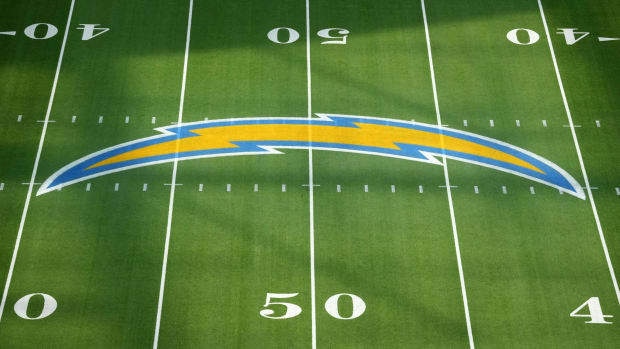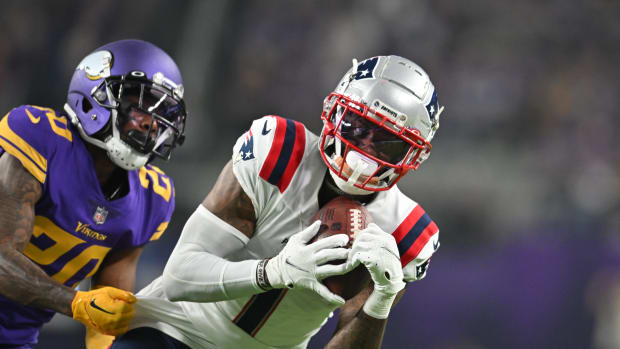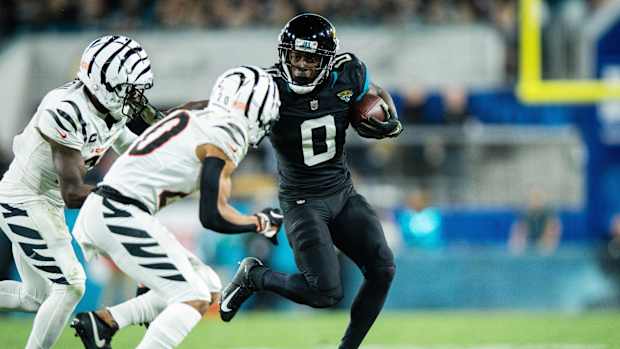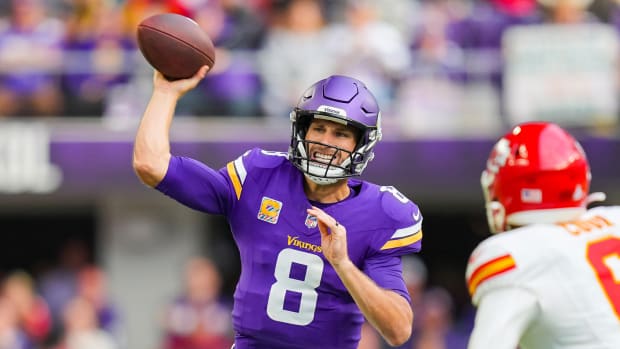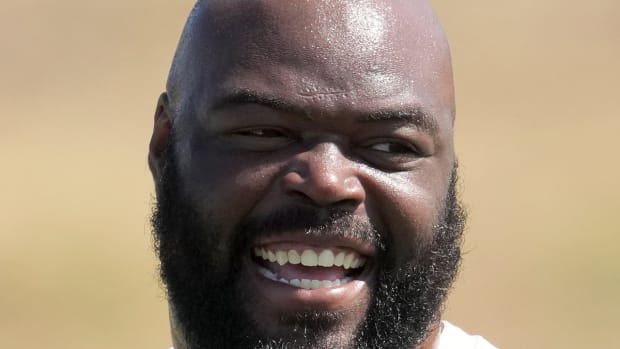It All Comes Down to Rams' New Corners, Mahomes Makes it Different for Playoff Andy Reid, Feel Free to Mock the Underdog Patriots
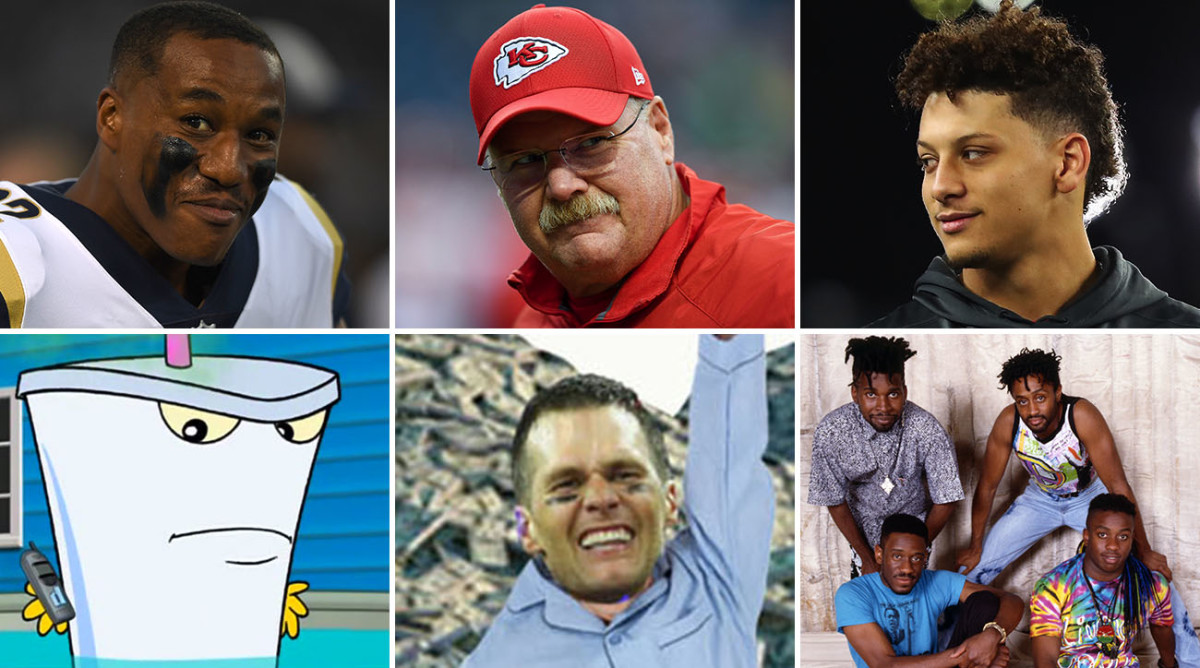
1. Some 10-plus months ago, the Rams swung two deals that seemed to transform their secondary into something potentially special. First, they got Marcus Peters from the Chiefs in a trade that was immediately dubbed the stealingest steal or all stealy steals that have ever been so stealily stolen and so on and so forth. Then, they brought in Aqib Talib, an old Wade Phillips pal. The Rams hadn’t just added two talented corners, they had added two of the most dangerous ball-hawking corners in football. They’d have Aaron Donald wreaking havoc up front, then Peters and Talib feasting on the back end, grabbing pick after pick.
As the Rams head to New Orleans for the NFC title game, it's in spite of their cornerback play. The duo that was supposed to be among the team’s strengths now looks like its biggest vulnerability. Talib missed half the season after ankle surgery and, while he’s rounding back into form, isn’t quite back to his old self. Then there’s Peters, who the Rams traveled with No. 1 receivers for a while this year. They had to abandon that approach after Peters too often became the human embodiment of a piece of bread heated to a char by some kind of electronic mechanism.
When these teams met in Week 9, Talib was out and Peters could not cover Michael Thomas. (You remember, he caught 12 passes for 211 yards including the 72-yard TD after which he performed the season’s lamest touchdown celebration by rehashing the previous decade’s lamest touchdown celebration—kind of like the TD celebration equivalent of when they remake The Emoji Movie in 2029). Even if the Peters-Talib duo had lived up to expectations this season, the Saints are a tough matchup for them. Peters and Talib are both off-coverage corners who want to keep an eye on the backfield and jump routes. But Drew Brees feeds off that. He’s arguably the best of all-time at manipulating defensive backs with his eyes and his shoulders—looking into the backfield against Brees is begging for trouble. The best way to defend the Saints right now would be to put your corners up on the line of scrimmage and make Brees, whose suspect arm strength was on display at times late in the year, beat you over the top. For the Rams, that would be asking their corners to completely change their styles, take on new identities, transform their very souls! It’s probably not a very good option.
The Rams could win on Sunday if Aaron Donald plays at his absolute peak and wrecks the game—always a real possibility. Or, if Jared Goff plays the game of his life and the Rams simply outscore New Orleans in their own building. Otherwise, Wade Phillips will have to come up with some kind of original plan for his two question marks at cornerback.
2. “Andy Reid chokes in the playoffs” has now entered the realm of something people tweet because… what else are you going to do, keep your lazily constructed misinformed narratives to yourself? Last week, what Reid did to the Colts defense and their bright young coordinator, Matt Eberflus, is outlawed in 46 states. It was complete and utter destruction from a coaching standpoint. (It also should have made a bunch of front offices who just hired head coaches think to themselves, Huh, maybe we should have waited a couple weeks for Eric Bieniemy... but what were we gonna do not rush into a short-sighted hire after our facial recognition technology had already identified the McVay-iest candidates?)
The Reid nonsense should already be put to rest, but on Sunday he’ll be coaching against Bill Belichick. Those guys have been coaching in the league since the beginning of time. It triggers our nostalgia, and it makes us feel like we should be pulling out some kind of historical comparison for the two coaches.
But Andy Reid is different this year, because Andy Reid has never had Patrick Mahomes. Donovan McNabb was a fine player, and Mike Vick was lightning in a bottle. Alex Smith is a likeable fella who avoids turnovers but whose antiquated, risk-averse style of quarterbacking required near-perfection from the coaching staff to win postseason games.
Mahomes (in conjunction with Tyreek Hill and Travis Kelce) can make two or three plays every week that defy schemes and play-calls and swing a game. Reid could be outcoached on Sunday, and Mahomes could still make enough plays to win the game. It happened when they beat the Ravens in overtime back in Week 14—Don Martindale won the chess match against Reid and his staff, but Mahomes pulled out three of four plays that few other quarterbacks are physically capable of making. In other words, this is the first time in his postseason career that Reid won't have to drastically outcoach his opponent in order to string together wins.
3a. The Patriots’ wholly unjustifiable proclamation of their underdogs status is obnoxious for so many reasons that if I were to compile the full list and publish it, the internet would crumble into itself like a black hole.
As someone who works in sports media, I take particular offense to this absurd, contrived and false underdog narrative because the underdog story is the nectar that feeds the sports journalism ecosystem. We don’t exclusively do underdog stories, but they are the cleanest, simplest and easiest narrative to play on. And they tend to be crowd-pleasers for the brain-dead idiots who comprise our audience. (Not you though, I’ve always said that Mensa is an illegitimate organization until you are admitted. And might I add, you’re really smelling good. Keep up the great work). If the Patriots can gain even the slightest legitimacy as underdogs in some people’s eyes, the term loses all meaning and the entire ecosystem is thrown into chaos.
Besides the fact that they're not underdogs because they have the same core cast of characters that are responsible for their unprecedented success, underdogs also tend to be relatable. Nick Foles was a great underdog story. He was contemplating retirement during the summer of 2016, on the verge of accepting a future of few thrills beyond reasonably priced whiskey and Mario Kart—just like you and me! And then he won the Super Bowl. Daniel “Rudy” Ruettiger is a great underdog story—the scrappy little guy! His perseverance and tackling a guy in a college football game made him famous enough that he could realize his dream of defrauding investors in a pump-and-dump scheme. Seventeen years ago Tom Brady was a great underdog story, the backup who replaced the injured $100 million franchise QB led one of the most unlikely turnarounds in sports history.
But Brady is now the undisputed greatest player in the sport’s history. He and Belichick have five Super Bowl rings and eight AFC titles. For God’s sake, Brady wakes up every morning wearing pajamas that give him super powers, next to a supermodel who has a nine-figure net worth, in a racecar bed that sits atop a mountain range of $100 bills:
At least I assume that's the basic layout of his master bedroom—if not he's made a huge mistake.
Just because a few people who barely follow football overreacted to a couple of early-season losses doesn’t make you an underdog. If anyone should feel disrespected, it is a team that, say, is the No. 1 seed in their conference, has the season’s MVP under center, is playing at a home field where they haven’t allowed 30 points to an opponent since second week of the 2015 season and went 8-0 with a point differential of +134 in real football games this season (playing Thursday Night Football on three days’ rest isn’t real football and therefore doesn’t count), yet is only giving the standard homefield advantage three points against a team they lost to, on the road, on a last-second field goal earlier this season.
Far be it from me to tell anyone how to self-motivate, and if the Patriots want to do the mental gymnastics required to convince themselves of their “underdog” status and pass the message among themselves in the locker room, go for it. But as far as the public proclamations, how about you just shut your hugely successful, incredibly wealthy and impossibly handsome faces and leave the underdog billing to the real underdogs.
3c. Against incredibly long odds, the “Bet Against Us” tees are only the second dumbest item available in Julian Edelman’s online shop.
What is with this hat? It’s a small black emblem on a black hat. This is an Aqua Teen joke come to life. Julian Edelman is The Drizzle:
If this is actually cool—a hat with a very small emblem that is also the same color of the hat so that someone would only notice if they were in uncomfortably close proximity to your right temple—I’ll stand down. After all, I’m 87 years old. The coolest person I can think of off the top of my head right now at this very moment is… uh… the guy from The Monkees? Who wore the hat all the time? If the emblem was bigger, and/or if it was an iconic logo, it makes some sense because then you can see and/or recognize what is on the hat. But, from where my very old mind and body and soul sit, this seems to be a plain black hat for. For $20. A sale price of $20.
3d. Because I feel a little bad busting on Julian Edelman’s crappy wares, I will add: This is a good beanie. However, it’s sold out. I just can’t win with this guy. (I actually don’t feel that bad busting on Julian Edelman’s crappy wares, mostly because I feel this raised quite a bit of awareness for his online store and no one cares about my tastes anyway.)
3e. I’d be remiss if I didn’t plug the items available in my own retail store. So get this official “Football Things” teal long-sleeve tee, featuring the “Football Things” tiny logo, also in teal, on the right chest, and your tiny initials monogrammed in the geometric center of the shirt’s front also in teal. A $109.99 value on sale for $107.49. Simply mail me your fax number, and I’ll fax you an order form, which you can fill out and then dictate to our messaging center in the form of a voicemail. Then, after a thorough background check and in-person interview, if everything checks out you'll have yourself a pretty swell shirt to go with your plain black hat. (Tell ‘em Andy Benoit sent ya and get free shipping on any purchase of 12 shirts or more!)
4. In Chicago, Matt Nagy and Ryan Pace devoted a piece of their season-ending press address to talk Cody Parkey, re: anger with. Indeed, Parkey’s Today Show appearance was upsetting to all of us—Where’s Katie Couric? WHAT HAPPENED TO KATIE COURIC!—but what’s really growing stale in Chicago is the eagerness to put so much of the blame on Parkey.
Pace deserves credit for putting together a solid roster aided by victory in the Khalil Mack sweepstakes last summer and, of course, helped along by the ridiculous rookie wage scale that demands any GM with a starting quarterback on a rookie deal grasp that unfair advantage and build aggressively around him. And Pace can even get a pass for the Parkey contract—Parkey has been better and has to be better going forward—even though cutting Parkey will be more expensive than keeping him for 2019. What Pace really needs to be held accountable for is the fact that the front office forced the Roquan Smith holdout last summer.
A quick refresher: The Bears wanted language in the contract saying they could strip Smith’s guarantees in the event of a suspension under the new helmet-lowering rule. (But they’d never, ever, ever actually strip his guarantees, they swore.) Eventually they settled on being able to strip his guarantees if he is suspended three-plus games for the helmet-lowering rule, the kind of punishment Smith would only receive if he, say, attached a broadsword to the top of his helmet and then led with it. Because of the holdout, Smith was ill-prepared for the regular season opener, playing only eight snaps in the loss at Lambeau Field. Considering the margin of defeat and the size of the lead they blew, it seems fair to say that’s a game they probably win if Smith had been in camp on time and therefore a full-go for the opener.
Yes, Butterfly Effect and all that, but ultimately the Bears came up a half-game short of the 2-seed in the NFC (they owned the tiebreaker with the Rams on account of de-pantsing them in their head-to-head matchup). So if the front office had gotten Smith signed in time and not gone with the all-too-typical approach across NFL front offices—setting a contractual precedent is better than winning 10 Super Bowls—they wouldn’t have been in need of a Parkey field goal to make it to the conference semifinals because they'd already have the bye. And, in fact, last week they would have most likely been hosting that Rams team they demolished on a Sunday night one month earlier.
Parkey deserves his portion of the blame, but so does the special teams unit that allowed an Eagles defender to get a finger on the kick, and so does the quarterback who sleepwalked through the first three quarters of a playoff game, and so does the defense that couldn’t get off the field when they needed to most. Football is the ultimate team sport. That extends to the front office—in this case, it especially extends to the front office—that seems all to eager to pin the blame on the kicker because his mistake was the final one.
5. I haven’t taken a good look at Kyler Murray yet because, frankly, I thought he was going to play baseball. And then the NFL playoffs started and there was no time (I've seen him play, I just haven't watched with any sort of critical eye). But in light of Murray size—approximately 5' 9", 180 pounds, I understand—I did want to mythbust a couple of, uh, myths, about the undersized quarterback quarterback. Because despite the stardom of Drew Brees, Russell Wilson and, soon, Baker Mayfield, QB height does matter.
a. The geometry of the NFL is different than the geometry of college football—between the centered hashmarks and speed of defenders, there is far, far less available space in the pros than there is in college. That is why, typically, the best offenses originate with the pocket as the launching point for the passing game. It forces the defense to cover the greatest amount of space (as you probably know, a football travels faster when it is thrown as opposed to when it is carried). If you can’t put stress on a defense by exploiting that space, you have to do it with some sort of misdirection, which can work but becomes less effective as time goes on.
b. Height allows a quarterback to better survey the field from the aforementioned optimal launching point. A common slice of idiocy passed around goes something like this: “All the offensive linemen are 6-foot-4 to 6-foot-7 and therefore taller than the quarterbacks, so it doesn't matter if you're 6-foor-2 or 5-foot-11.” I’m only vaguely familiar with the human anatomy so feel free to run this by a doctor, but my understanding is that you have the top of the head, then the middle and lower parts of the head, below which is the neck. Then, at the bottom of the neck, the body—to use a scientific term—“spreads out” into the shoulders and then the arms. (And there’s a bunch of other things down there, a liver, kneecaps and whatnot.)
The point is, a 6-foot-6 person isn’t shaped like a 6-foot-6 rectangular wall. Plus, a person’s (in this case, a quarterback’s) eyes are not at the very top of their head. Apologies to any very tall readers because you won’t be able to participate in this fun experiment, but for everyone else: stand behind someone 2-3 inches taller than you and look beyond them. O.K., good. Now, stand behind someone 6-7 inches taller than you and look beyond them… See! While they’re both taller than you, your view is far more obstructed when standing behind the taller person, because your eye level is below their shoulders, right? (And we're having so much fun that we won't even factor in pads.) Now imagine five teammates and a couple defenders are in front of you while you’re trying to see off into the middle distance. It’s much easier if there’s a small height difference as opposed to a large one, right?
c. But wait! That doesn’t mean only height matters. It’s just one of the things that matters. Accuracy matters, arm strength matters, athleticism matters, a willingness to get your face smashed in matters, being a cool and likable guy to your teammates matters. Saying “height matters” doesn’t imply Brock Osweiler is better than Russell Wilson, just like saying “arm strength matters” doesn’t imply Paxton Lynch is better than Drew Brees, just like saying “accuracy matters” doesn’t imply Cody Kessler is better than Cam Newton, just like saying “athleticism matters” doesn’t imply Mitchell Trubisky is better than Tom Brady, just like saying “being a likable teammate matters” doesn’t imply Tyrod Taylor is better than Ben Roethlisberger.
There are solutions for small quarterbacks. You can have him take deeper drops, you can put him on the move, you can put an emphasis on building your interior offensive line to open passing lanes. You’re seeing more and more creative workarounds for smaller quarterbacks, especially as rushing games and passing games become more seamlessly integrated. That’s good news. But being a smaller quarterback does affect your ability to play from the pocket, and therefore compromises your ability to utilize that ideal geometry for play designs.
d. All of this reminds me of Eyehole Man from Rick & Morty. I hope to convince both my kids to go trick-or-treating as Eyehole Man next Halloween.
e. Brees is a maestro of manipulating opponents in the secondary. Wilson has the otherworldly ability to map the field on the move like LeBron maps the court when driving the lane, and is also the best deep-ball thrower in the NFL right now—outrageously, almost offensively good at throwing over the top. Brees, Russell, Baker, Flutie… every time NFL evaluators knock a great college quarterback for being too small, he becomes a star. I don’t take that to be a literal statement, but I did want to see just how often undersized star QBs from college succeed in the NFL.
I made a list of every quarterback to finish top-10 in the Heisman voting (I assume we can all agree that’s a reasonable cutoff for “star college quarterback”) since Doug Flutie. Then, I took that list and put it in a spreadsheet, which I should have done in the first place. Then, I split the list based on player heights at the combine or their pro day, with 6' 2" as the rule-of-thumb cutoff between “big” and “small” quarterbacks. Then, I highlighted players who had significant careers—or project to have significant careers—as NFL starters.
Before I reveal the findings of this highly scientific data, I want to reiterate the subjectiveness of “significant career as an NFL starter.” There is also a self-fulfilling-prophecy aspect to this (some small quarterbacks didn’t get a chance to prove themselves because of the conventional wisdom that small quarterbacks don’t work in the NFL, which led to fewer small quarterbacks in the NFL, which, to some, further proved that small quarterbacks shouldn’t get a chance in the NFL, which… you get it), some of these guys came from college offenses that clearly would not translate to the NFL, and as mentioned a little earlier, teams are better at designing offenses for undersized QBs than ever before.
Here are the small college superstar quarterbacks, nine of 47 (19.1%) of whom had significant careers as NFL starters.
And, for context, of the 75 QBs 6' 2" or taller who finished top 10 in Heisman voting, 41 (54.7%) went on to have significant careers as NFL starters.
f. None of this prevents Kyler Murray from having success at the next level should he choose football. But, yes, height is one of the attributes that matters for an aspiring NFL quarterback.
6. Ladies and gentlemen . . . Living Colour!
• Question or comment? Email us at talkback@themmqb.com.






































